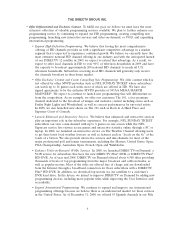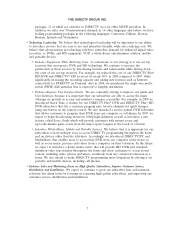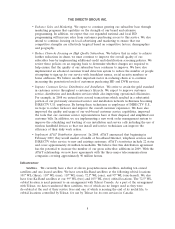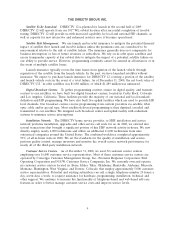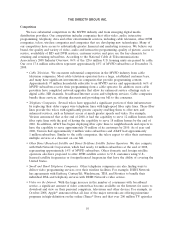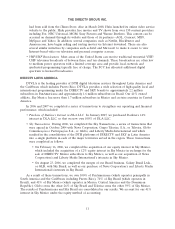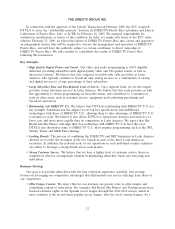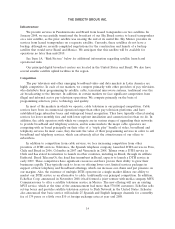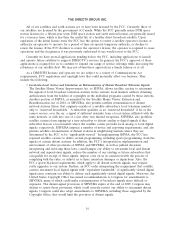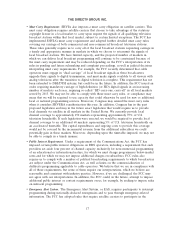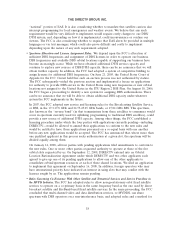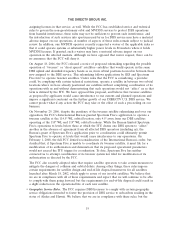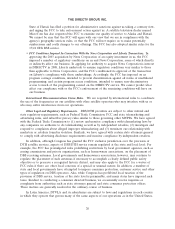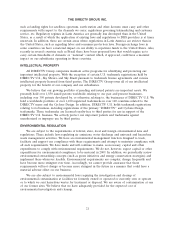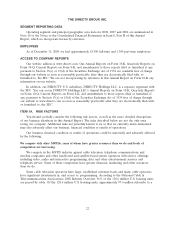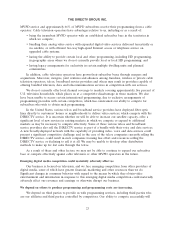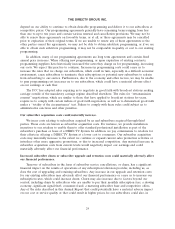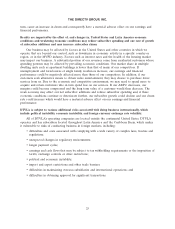DIRECTV 2008 Annual Report Download - page 28
Download and view the complete annual report
Please find page 28 of the 2008 DIRECTV annual report below. You can navigate through the pages in the report by either clicking on the pages listed below, or by using the keyword search tool below to find specific information within the annual report.THE DIRECTV GROUP, INC.
In a number of markets, existing wireline telephony operators have announced their intention to
upgrade their infrastructure in order to provide new and enhanced services, including video
programming. These and other companies have announced plans to build wireless broadband networks
that will also be capable of delivering broadband, telephony and video services. However, to date only a
very small number of such upgrades and build outs have been actively pursued on other than a test
basis.
ACQUISITIONS, STRATEGIC ALLIANCES AND DIVESTITURES
We review our competitive position on an ongoing basis and, from time to time, consider various
acquisitions, strategic alliances and divestitures, including potential wireless broadband investments or
alliances, in order to continue to compete effectively, improve our financial results, grow our business
and allocate our resources efficiently. We also consider periodically making equity investments in
companies with which we can jointly provide services to our subscribers.
GOVERNMENT REGULATION
We are subject to government regulation in the United States, primarily by the FCC, and similar
regulatory agencies in Latin America and, to a certain extent, by the legislative branches, other federal
agencies, and state and local authorities in the countries where we operate. We are also subject to the
rules and procedures of the International Telecommunications Union, or ITU, a specialized agency of
the United Nations within which governments and the private sector coordinate global
telecommunications networks and services. Depending upon the circumstances, noncompliance with
legislation or regulations promulgated by these entities could result in the suspension or revocation of
our licenses or registrations, the termination or loss of contracts or the imposition of contractual
damages, civil fines or criminal penalties.
This section sets forth a summary of regulatory issues pertaining to our operations in the United
States and is not intended to describe all present and proposed government regulation and legislation
affecting the MVPD industry or our business.
FCC Regulation Under the Communications Act and Related Acts. The Communications Act and
other related acts give the FCC broad authority to regulate the operations of our company.
The ownership and operation of our DBS/DTH system is regulated by the FCC primarily for:
• the licensing of DBS and DTH satellites, earth stations and ancillary authorizations;
• the assignment of frequencies and orbital slots, the relocation of satellites to different orbital
locations or the replacement of an existing satellite with a new satellite;
• compliance with the terms and conditions of assignments and authorizations, including required
timetables for construction and operation of satellites;
• avoidance of interference by and to DBS/DTH operations with operations of other entities that
make use of the radio spectrum; and
• compliance with the Communications Act and FCC rules governing U.S.- licensed DBS and
DTH systems.
The FCC grants authorizations to satellite operators that meet its legal, technical and financial
qualification requirements. The FCC conditions such authorizations on satisfaction of ongoing due
diligence, construction, reporting and related obligations.
15



